
Custom software transforms business operations by streamlining processes, enhancing data management, and improving customer relationship management. Tailored solutions automate tasks, integrate functions, and provide personalized experiences. This ultimately leads to increased efficiency and a competitive advantage, illustrating the critical role of custom software in today’s business landscape.
In an age where digital transformation is imperative, businesses are increasingly turning to custom software solutions to enhance operational efficiency. Tailored applications not only streamline processes and improve data management but also foster innovation and adaptability in a rapidly changing marketplace.
Yet, the challenge persists: how can organizations leverage these bespoke solutions to meet current demands while anticipating future needs?
Exploring the myriad ways custom software can revolutionize business operations reveals significant benefits and strategic considerations essential for successful implementation.
In today's digital landscape, the significance of robust cybersecurity measures cannot be overstated. Cyber Solutions Inc. specializes in delivering tailored IT and cybersecurity services designed to empower businesses to operate efficiently and securely. By focusing on the unique needs of various industries, the company ensures that clients can effectively mitigate risks associated with digital threats while optimizing their IT infrastructure. This holistic approach not only enhances security but also allows organizations to concentrate on their core operations without the burden of IT complexities.
With services such as 24/7 help desk support and managed security offerings, Cyber Solutions Inc. establishes itself as a reliable partner in navigating the complexities of contemporary IT environments. In an era where cyber threats are ever-evolving, organizations must prioritize their cybersecurity strategies to safeguard sensitive data and maintain operational integrity. The challenges faced by businesses today require a proactive stance, one that Cyber Solutions is well-equipped to provide.
By leveraging industry expertise and innovative solutions, Cyber Solutions Inc. addresses the pressing cybersecurity challenges that organizations encounter. Their commitment to understanding the specific needs of clients ensures that each solution is not only effective but also aligned with the organization's goals. As businesses strive to enhance their security posture, partnering with a knowledgeable provider like Cyber Solutions Inc. becomes essential for success.
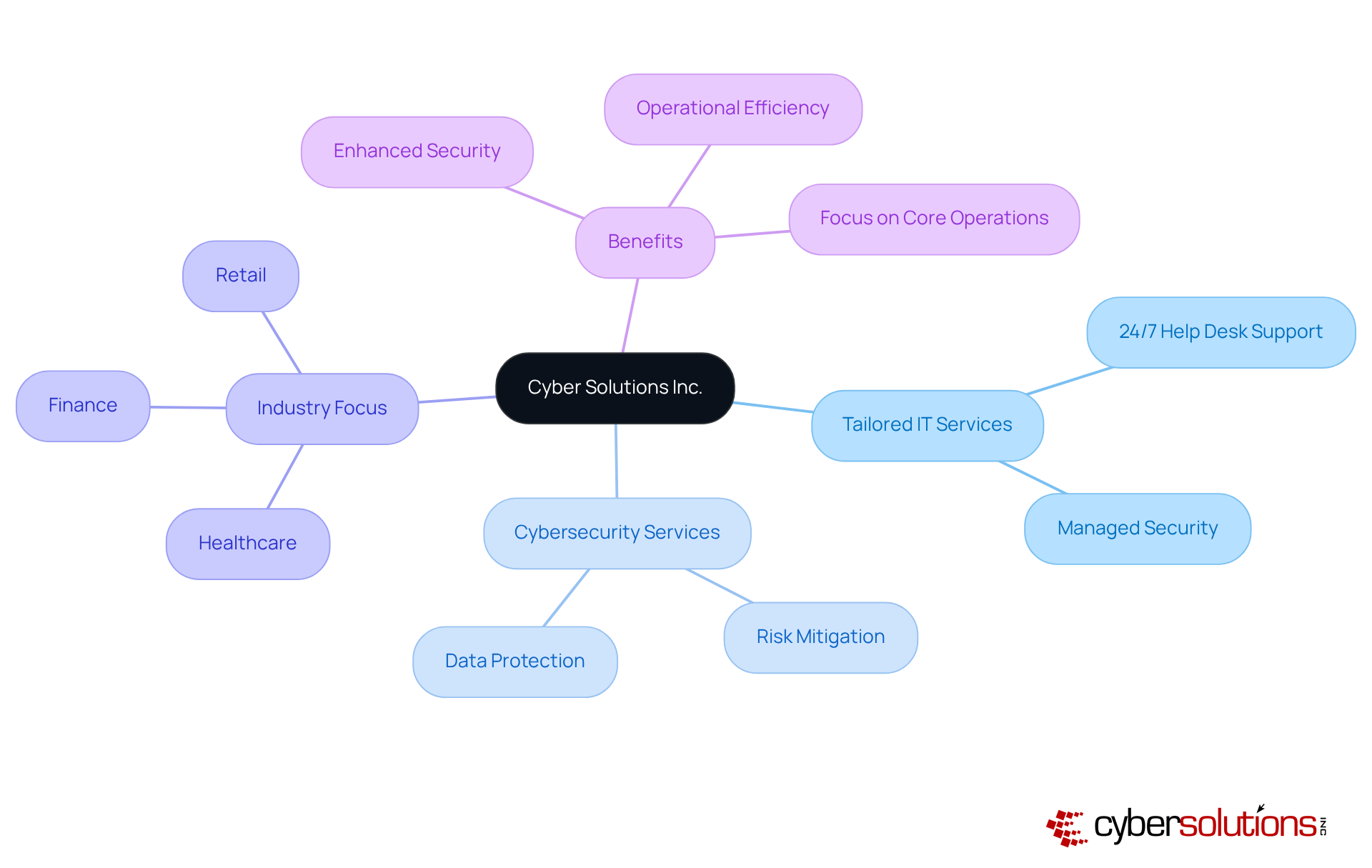
The custom software business is a powerful tool that enables businesses to create tailored solutions aligned with their specific operational needs, significantly streamlining processes. By automating repetitive tasks and integrating various functions, organizations can effectively reduce manual errors and enhance overall efficiency. For instance, implementing a customized inventory management system can automate stock tracking, which reduces the time spent on manual entries and lowers the chances of stockouts or overstocking. This approach conserves valuable time and optimizes resource allocation, allowing teams to focus on strategic initiatives.
Looking ahead to 2025, companies in the custom software business that leverage tailored applications for automation are expected to experience significant enhancements in productivity and operational efficiency, as they eliminate monotonous tasks and foster a more flexible work environment. However, it is crucial to consider the challenges associated with tailored application development, such as the necessity for substantial initial investment and ongoing maintenance. As one business leader insightfully remarked, "Tailored applications are a means to ultimately arrange the disorder of various programs and tools utilized daily in your company." Furthermore, statistics indicate that the average duration to achieve ROI for personalized applications is approximately 12 months, underscoring the strategic importance of investing in tailored options.

A custom software business is essential for enhancing data management, as it provides tailored databases and advanced analytics tools that align with specific business requirements. Consider the healthcare sector: organizations can deploy custom electronic health record (EHR) systems that not only secure patient data but also facilitate seamless retrieval and analysis. This capability is paramount; studies show that 88% of U.S. office-based physicians have adopted centralized EHR systems, significantly improving chronic disease management and care coordination.
The healthcare IT market is projected to grow from $360 billion in 2024 to over $730 billion by 2029, underscoring the increasing reliance on advanced data management systems. Improved data management through tailored software simplifies adherence to regulations and enhances reporting and insights, enabling organizations to make informed decisions swiftly.
Moreover, the integration of customized approaches can lead to better patient outcomes, as evidenced by the advancements in telemedicine and the burgeoning telepharmacy sector, expected to reach $27.36 billion by 2029. As organizations enhance their data management capabilities, the necessity for a custom software business to create customized databases becomes increasingly evident, highlighting the need for strategic investments in technology that drive operational efficiency and excellence in patient care.
Furthermore, with cybersecurity in healthcare IT surpassing $12 billion in 2020, it is imperative to implement robust security measures, such as application allowlisting. This proactive strategy prevents unauthorized programs from executing, thereby protecting sensitive patient data and ensuring compliance with regulations like HIPAA and GDPR. It encompasses features such as continuous monitoring of application activity and centralized management of allowlists, which are vital for maintaining security. As Anastasia M., Tech Team Lead, notes, "The healthcare information technology market size is soaring as digital innovations integrate further into every aspect of the U.S. healthcare."
To fully leverage the advantages of tailored software systems, C-suite leaders must prioritize investments in technologies that not only enhance data management but also ensure compliance and security, ultimately leading to improved patient care.
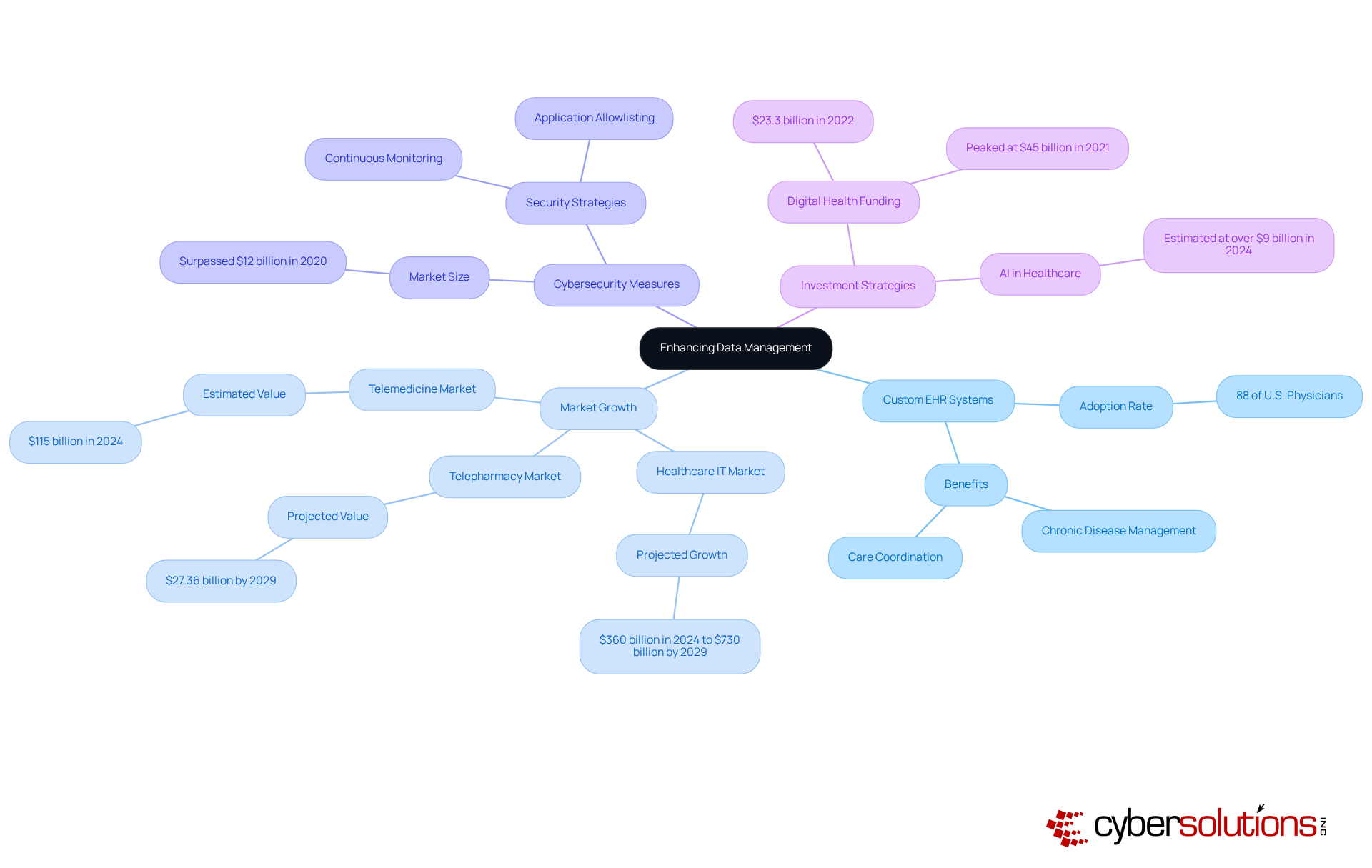
Custom CRM solutions empower businesses to customize their customer interactions, aligning them with specific needs and preferences. By incorporating features such as personalized communication, automated follow-ups, and comprehensive customer profiles, organizations can significantly enhance customer satisfaction and loyalty. For instance, a personalized CRM can meticulously track customer interactions and preferences, enabling sales teams to tailor their pitches effectively. This targeted approach not only boosts customer engagement but also drives sales growth by cultivating stronger relationships.
Data indicates that personalized communication can lead to a notable increase in sales, with businesses reporting up to a 20% growth in revenue when leveraging tailored CRM features. As businesses progressively acknowledge the importance of tailored customer experiences, investing in a custom software business that provides specialized CRM systems becomes vital for sustaining a competitive advantage in 2025. Furthermore, tailored CRMs can simplify training procedures for new employees, boosting productivity and operational effectiveness.
They also help businesses maintain a unique identity in a crowded market through personalized interactions, while enhancing security measures tailored to specific industry needs. As such, the long-term cost savings from better efficiency, higher employee productivity, and enhanced customer retention make investing in a custom software business that provides CRM systems a strategic decision.
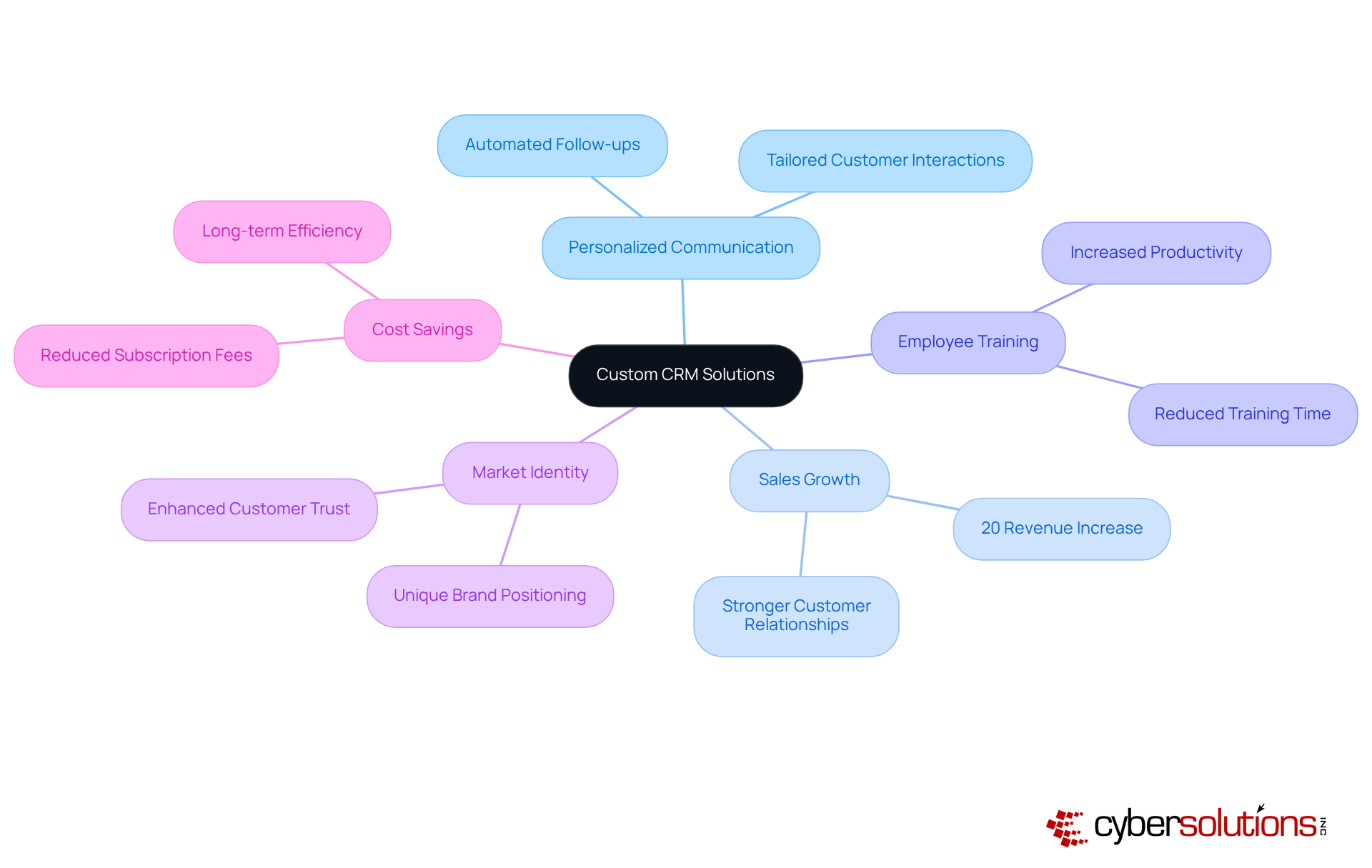
A custom software business inherently crafts solutions for scalability, enabling businesses to expand effortlessly without the burden of complete system overhauls. As organizations grow, their systems can evolve to manage increased workloads, accommodate additional users, and incorporate new functionalities. For instance, a custom project management tool may begin with essential features but can be enhanced to include advanced analytics and reporting capabilities as the team scales. This adaptability not only allows businesses to respond swiftly to market changes and customer demands but also minimizes the risk of incurring significant additional costs.
Research indicates that scalable systems can lead to substantial cost savings, with companies like Outecho achieving 24% cost reductions through effective project management, demonstrating the financial benefits of investing in adaptable solutions. Moreover, industry leaders stress that investing in flexible technology is essential for ongoing business growth within a custom software business, as it guarantees that organizations remain competitive and responsive in a constantly changing environment. As pointed out by Grace Hopper, complacency in established methods can obstruct progress, making it essential for businesses to adopt scalable approaches that correspond with their growth paths.
To evaluate your current system's scalability, consider conducting a thorough assessment of its performance under increased loads and its ability to integrate new features without substantial downtime.
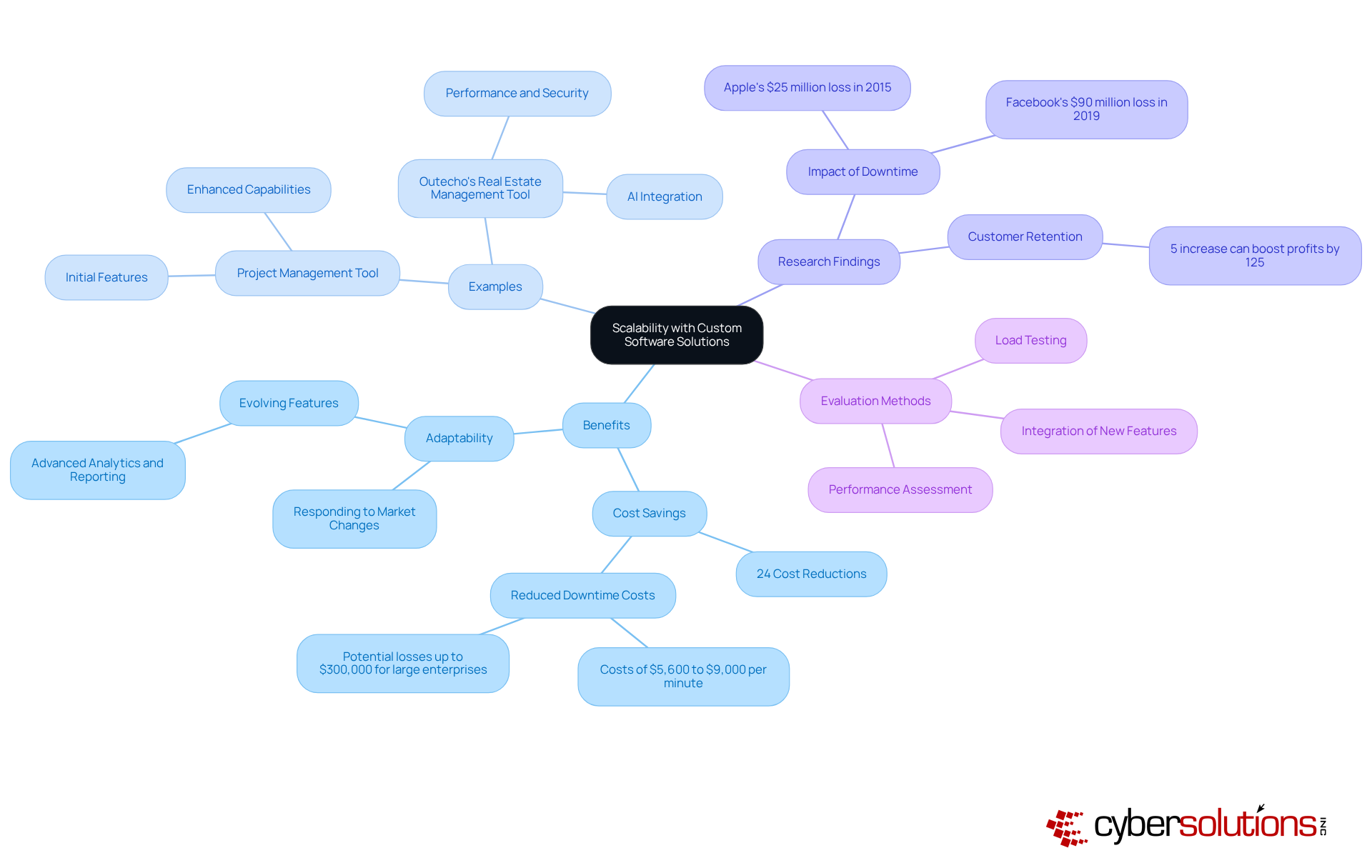
Custom software business solutions are essential for integrating diverse business functions, such as finance, HR, and operations, into a cohesive platform. This integration minimizes data silos and promotes enhanced collaboration among teams. Consider a custom ERP system: it can connect inventory management with sales and finance, providing real-time insights into stock levels and financial performance. This comprehensive perspective empowers organizations in the custom software business to make informed decisions swiftly and adapt to market changes effectively, ultimately boosting their operational efficiency.
In fact, 91% of companies utilizing ERP systems report optimized inventory levels, while 66% indicate that their ERP solutions have improved operational efficiency. Furthermore, 77% of organizations have successfully eliminated data silos through ERP implementation, and 78% have experienced increased productivity as a result of their ERP initiatives. These statistics underscore the transformative impact of integrated solutions on collaboration and productivity.
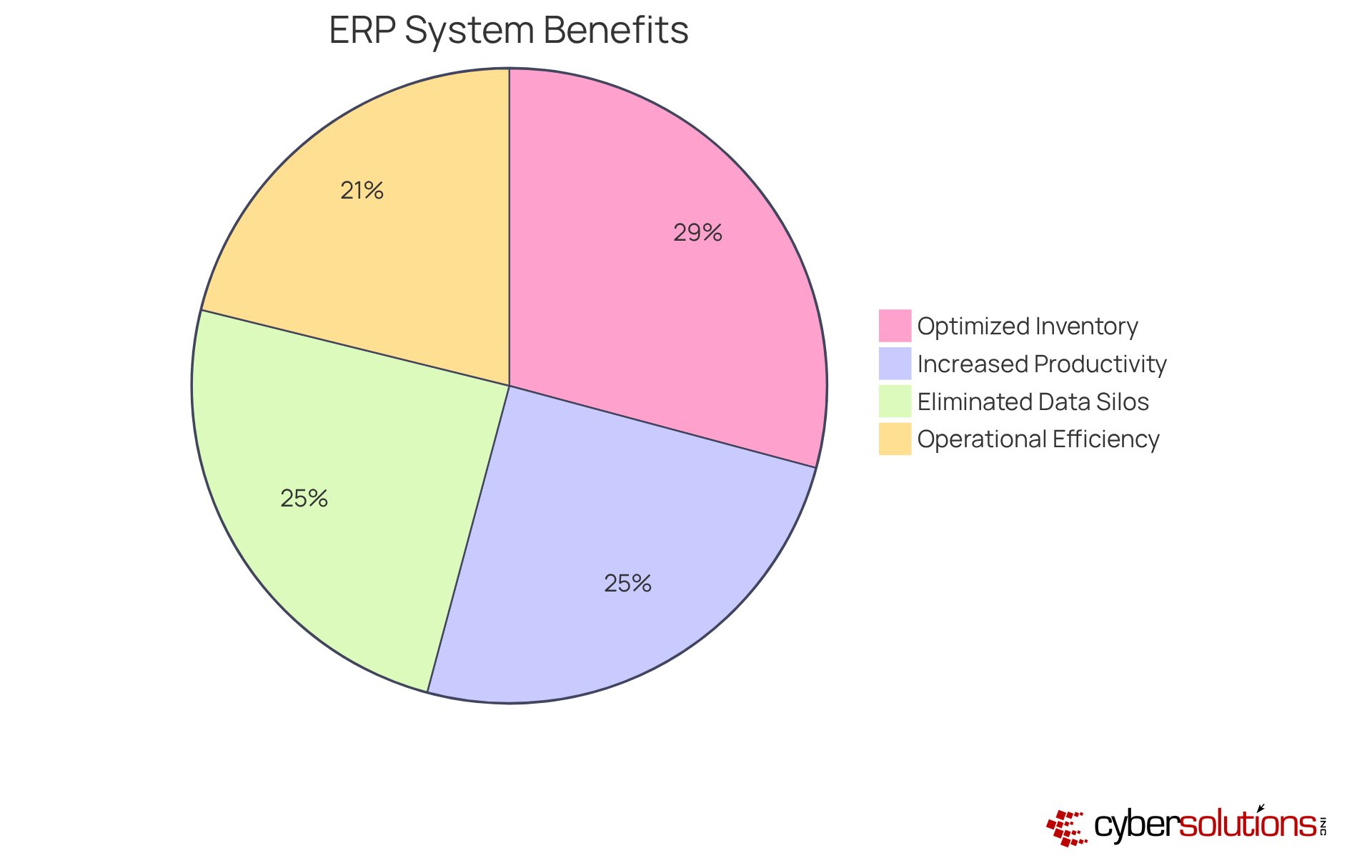
Investing in a custom software business provides companies with a significant competitive advantage. By addressing specific pain points and enhancing operational capabilities, organizations can effectively differentiate themselves in the marketplace.
Consider the impact of a custom software business; it can provide unique features that cater to specific customer needs, such as:
This strategic approach not only attracts more customers but also fosters brand loyalty, ultimately leading to increased market share. In today's competitive landscape, the ability to meet distinct customer demands is paramount for sustained growth.
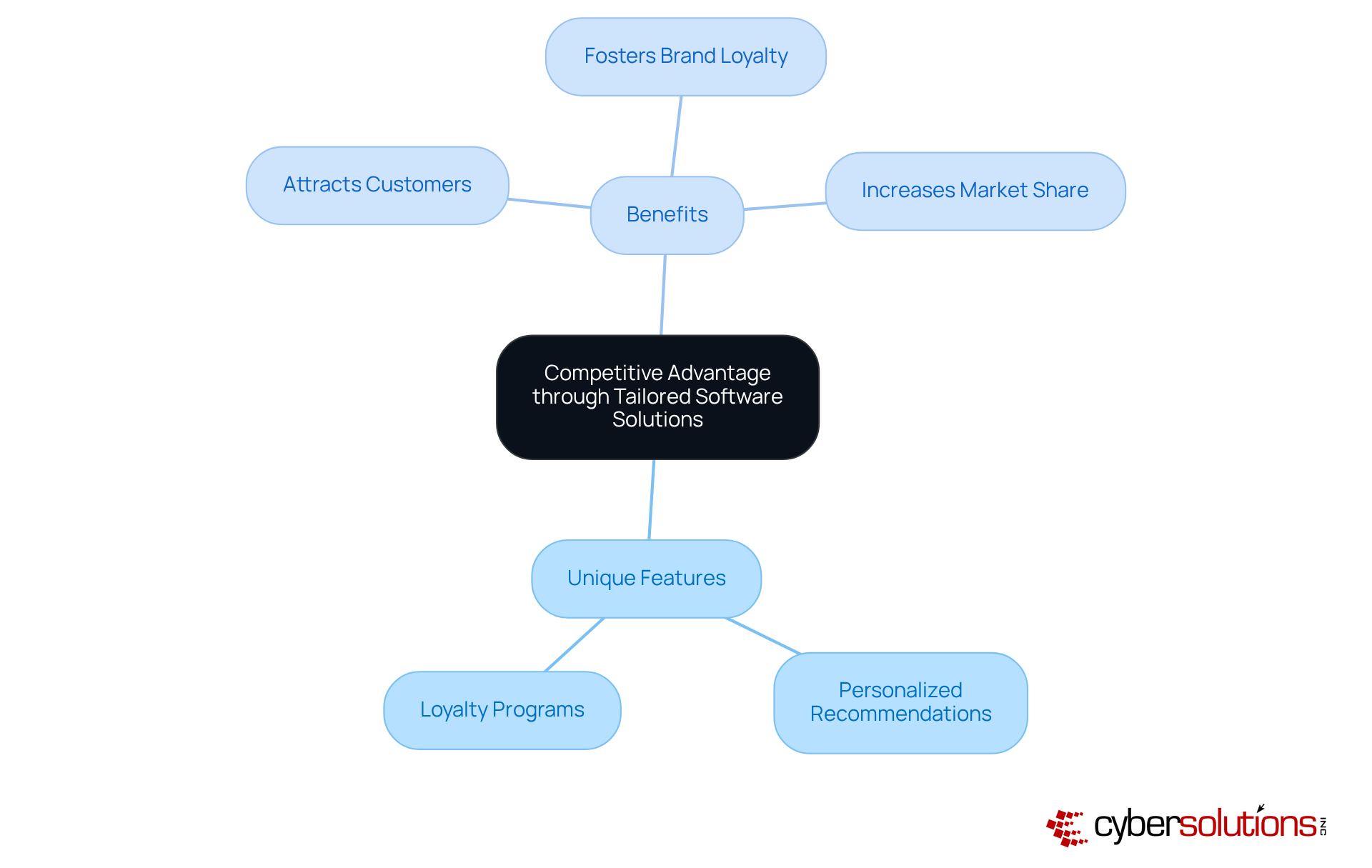
In today's rapidly evolving digital landscape, ensuring compliance with industry regulations such as HIPAA, PCI-DSS, and GDPR is paramount for healthcare organizations. Custom software business solutions are essential in this regard, as they can be meticulously designed to incorporate critical features like data encryption, access controls, and audit trails. These elements not only help mitigate the risk of non-compliance but also enhance the security of sensitive patient information.
Consider the implications for healthcare CFOs who face unique challenges in navigating these regulatory waters. A custom healthcare application can include built-in compliance checks that alert users to potential violations, ensuring that patient data is handled securely and in accordance with regulations. This proactive approach not only protects the organization from legal repercussions but also builds trust with clients and stakeholders, fostering a reputation for reliability and integrity.
By investing in a custom software business that offers tailored software solutions, healthcare organizations can effectively address the pressing cybersecurity threats they face. The integration of compliance features is not merely a legal obligation; it is a strategic advantage that positions organizations to thrive in a competitive environment. As the landscape of cybersecurity continues to evolve, the importance of such solutions will only grow, making it imperative for organizations to act now.
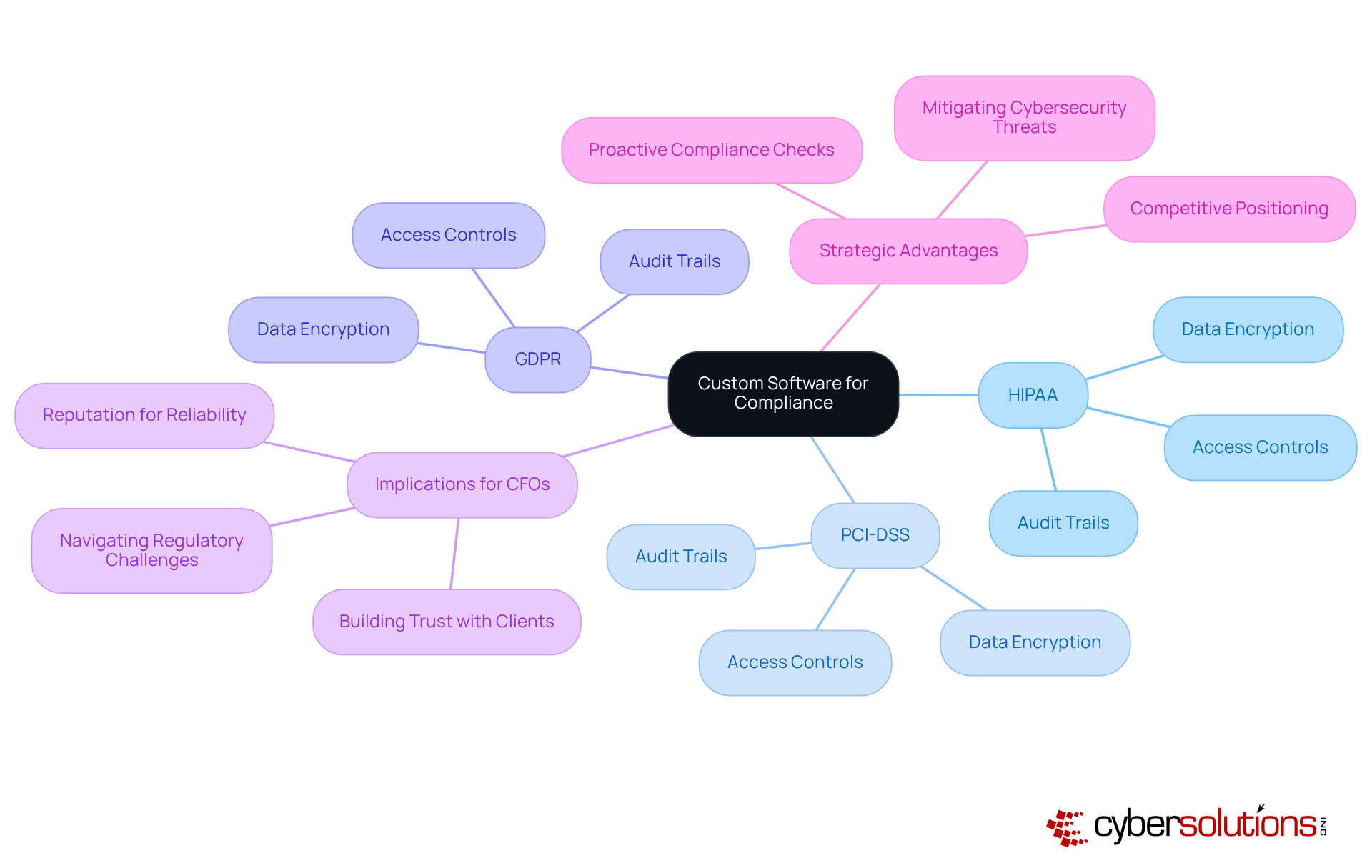
Custom applications significantly enhance user experience by providing intuitive interfaces and tailored functionalities that cater to the specific needs of employees. Prioritizing user-centric design minimizes the learning curve associated with new systems, facilitating quicker adoption and boosting productivity. For instance, a custom dashboard that consolidates key metrics and tasks enables employees to manage their workloads more effectively, leading to improved performance and job satisfaction.
Studies show that entities adopting intuitive application designs can experience productivity boosts of up to 30%, highlighting the essential role of user experience in enhancing operational efficiency. As noted by UX designers, 'When applications align with user needs, it not only enhances engagement but also fosters a more motivated workforce, ultimately contributing to the company's success.'
Anticipating 2025, the custom software business is projected to see an increase in the need for tailored applications as businesses persist in digitizing services and enhancing customer experiences. Numerous offerings are integrating AI functionalities to further improve user interactions. Instances of user-friendly design, such as adaptive learning platforms in education and customized dashboards in project management tools, demonstrate how personalized approaches can result in substantial productivity improvements.

Custom technological solutions are pivotal in driving innovation, offering the flexibility necessary for experimentation with new ideas and processes. Organizations can seamlessly implement pilot projects or introduce new features without the limitations imposed by off-the-shelf software. For instance, a tailored application can be crafted to test new service offerings or customer engagement strategies, enabling businesses to gather real-time feedback and iterate swiftly. This culture of continuous improvement enhances operational capabilities and positions entities as leaders in their respective industries.
Significantly, data shows that pilot projects employing personalized applications have a markedly higher success rate. Numerous organizations report up to a 20% rise in revenue after implementing tailored solutions. Industry leaders emphasize that flexibility in software development is crucial for adapting to market changes and meeting evolving customer needs. This reinforces the strategic value of investing in custom software, which not only addresses immediate challenges but also fosters long-term growth and competitiveness.

Custom software development emerges as a transformative force for businesses, reshaping operational dynamics and enhancing efficiency across various sectors. By tailoring solutions to meet specific needs, organizations can streamline processes, improve data management, and foster better customer relationships, ultimately leading to a more agile and competitive business environment.
Key insights highlight the importance of:
Each of these elements plays a crucial role in driving productivity and innovation. For instance, custom CRM solutions not only boost customer satisfaction but also contribute to significant revenue growth. Moreover, scalable software ensures that businesses can adapt and evolve in response to market demands without incurring excessive costs.
The significance of investing in custom software cannot be overstated. As organizations navigate an increasingly complex digital landscape, prioritizing tailored solutions will enhance operational efficiency and position them for long-term success. By embracing innovation and continuous improvement through custom software, businesses can secure a competitive edge, ensuring they remain responsive to customer needs and market trends. The future belongs to those who adapt—now is the time to invest in custom solutions that will drive growth and excellence.
What services does Cyber Solutions Inc. provide?
Cyber Solutions Inc. offers tailored IT and cybersecurity services, including 24/7 help desk support and managed security offerings, designed to empower businesses to operate efficiently and securely.
Why is cybersecurity important for businesses today?
Cybersecurity is crucial for businesses to safeguard sensitive data, maintain operational integrity, and mitigate risks associated with ever-evolving digital threats.
How does Cyber Solutions Inc. approach cybersecurity?
The company takes a holistic approach by focusing on the unique needs of various industries, ensuring that solutions are effective and aligned with the organization's goals.
What are the benefits of custom software development for businesses?
Custom software development allows businesses to create tailored solutions that streamline processes, automate repetitive tasks, reduce manual errors, and enhance overall efficiency.
What challenges are associated with tailored application development?
Challenges include the necessity for substantial initial investment, ongoing maintenance, and the average duration of approximately 12 months to achieve ROI for personalized applications.
How can customized solutions enhance data management?
Customized solutions provide tailored databases and advanced analytics tools that improve data management, streamline adherence to regulations, and enhance reporting and insights.
What is the significance of electronic health record (EHR) systems in healthcare?
Custom EHR systems secure patient data and facilitate seamless retrieval and analysis, significantly improving chronic disease management and care coordination.
What is the projected growth of the healthcare IT market?
The healthcare IT market is projected to grow from $360 billion in 2024 to over $730 billion by 2029.
How does cybersecurity relate to healthcare IT?
With cybersecurity in healthcare IT surpassing $12 billion in 2020, implementing robust security measures, such as application allowlisting, is essential to protect sensitive patient data and ensure regulatory compliance.
What should C-suite leaders prioritize regarding technology investments?
C-suite leaders should prioritize investments in technologies that enhance data management, ensure compliance and security, and ultimately lead to improved patient care.